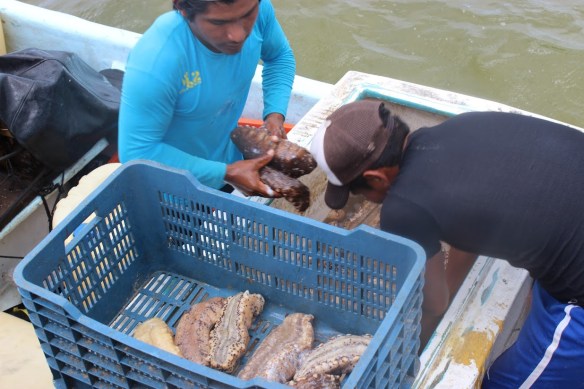Coastal communities are struggling with the complex social and ecological impacts of a growing global hunger for a seafood delicacy, according to a new study from the University of British Columbia.
“Soaring demand has spurred sea cucumber booms across the globe,” says lead author Mary Kaplan-Hallam, who conducted the research as a master’s student with the Institute for Resources, Environment and Sustainability (IRES) at UBC.
“For many coastal communities, sea cucumber isn’t something that was harvested in the past. Fisheries emerged rapidly. Money, buyers and fishers from outside the community flooded in. This has also increased pressure on other already overfished resources.”
Sea cucumber can sell for hundreds–sometimes thousands–of dollars a pound. The “gold rush” style impacts of high-value fisheries exacerbate longer-term trends in already vulnerable communities, such as declines in traditional fish stocks, population increases, climate change and illegal fishing.
“These boom-and-bust cycles occur across a range of resource industries,” says co-author Nathan Bennett, a postdoctoral fellow at UBC. “What makes these fisheries so tricky is that they appear rapidly and often deplete local resources just as rapidly, leaving communities with little time to recover.”

Sea cucumber fishing season 2016 (Dzilam de Bravo, Yucatan, Mexico). Credit: Eva Coronado, National Polytechnic Institute, Mexico.
The researchers based their findings on a case study of Río Lagartos, a fishing community on Mexico’s Yucatán Peninsula. For the past 50 years, small-scale commercial fishing has been the dominant livelihood of the community.
The town’s first commercial sea cucumber permits were issued in 2013, a significant economic opportunity for fishers in the region. The leathery marine animals are a delicacy in many parts of Asia, and as stocks have depleted there, demand has rapidly depleted fisheries across the globe.
A host of new challenges emerged in Río Lagartos as the sea cucumbers attracted outside fishers, money and patrons, according to the researchers’ interviews with community members.
“Resource management, incomes, fisher health and safety, levels of social conflict and social cohesion in the community are all impacted,” says Kaplan-Hallam. “The potential financial rewards are also causing local fishers to take bigger risks as sea cucumber stocks are depleted and diving must occur further from shore, with dire health consequences.”
Unfortunately, say the authors, this isn’t an isolated situation.
“There are many examples around the world where elite global seafood markets–abalone, sea urchins, sharks–are undermining local sustainability,” says Bennett. “If we want to sustainably manage fisheries with coastal communities, we need a better understanding of how global seafood markets impact communities and how to manage these impacts quickly. Think of it like an epidemic: it requires a rapid response before it gets out of control.”
###
The study “Catching sea cucumber fever in coastal communities” is published in Global Environmental Change
The research was funded by the Social Sciences and Humanities Research Council, MITACS, the Banting Postdoctoral Fellowship program, and the Liber Ero Fellowship program.


